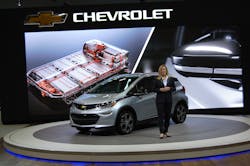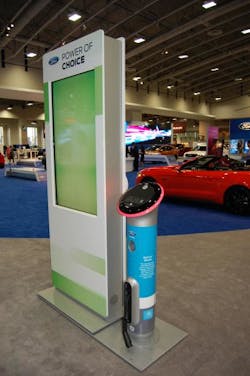There’s been a lot of noise about electrified trucks in the freight world of late – go here and here for just two examples – and of course it seems at times you can’t go anywhere without hearing or seeing something regarding the electrically-powered (and high priced) Tesla car.
[The Tesla’s autopilot function, however, has more than a few folks spooked.]
Despite all the hoopla, though, a recent survey indicates that electric vehicles (EVs) aren’t making much of an impression on a goodly number of American drivers. And when they do get their attention, high sticker prices and range uncertainty remain big turnoffs.
According to a survey of over U.S. 2,500 consumers conducted by global consulting firm Altman Vilandrie & Company, some 60% say they are “unaware” about electric cars, with 80% stating they’ve “never ridden in or driven one.”
However, the firm’s poll also found that a “clear majority” of consumers who have been inside an EV enjoyed the experience and would purchase one -- if lower-priced models were available.
That, of course, is the real trick, isn’t it?
In analyzing the survey data, Altman Vilandrie & Company said the EV market would “grow significantly” with the availability of more affordable EVs, specifically at the price point of $35,000.For example, Tesla, which is launching the lower-priced Model 3 in 2017, would generate up to a five times higher adoption rate at a $35,000 price tag than the carmaker experienced for the more expensive Model S and Model X (which can cost from $75,000 to over $100,000).
Altman Vilandrie & Company also estimates that the release of less expensive models by other automakers would boost EV adoption by nearly 24 times the current market.
“Price matters, and our analysis shows that more affordable models would go a long way to changing the perception that EVs are luxury items for the urban elite,” noted Soumen Ganguly, who co-directed the survey along with Moe Kelley, in a statement.
“Both electric and self-driving vehicles are the future of personal transportation,” he said. “But carmakers need to make sure consumers are excited about going electric now, and that goes beyond the obvious environmental benefits.”
“While the EV adoption rate is low, there are signs of strong latent demand in the marketplace,” added Kelley. “The auto industry still needs to make more low-priced models available to consumers, as well as finding a way for more drivers to try out an EV. If those things happen we should see the EV adoption rate accelerate.”
Here are a few other factoids Altman Vilandrie & Company gleaned from this particular poll regarding EVs:
- Their survey showed that a perceived lack of charging stations (85%), high costs (83%) and uncertainty over duration of charge (74%) were the top reasons for not wanting to purchase an EV.
- Only 3% of survey respondents said they currently own an EV, while 10% said they planning to buy an EV as their next car.
- Some 60% of consumers who have experienced an EV say they “enjoyed” it; only 8% said they didn’t enjoy it.
- Range anxiety still exists for all drivers in the survey, from those who are in the car for more than three hours a day (87%) to drivers on the road for less than an hour a day (72%).
- The survey shows that younger and more affluent consumers were more likely to buy an EV than the rest of the motoring public: 17% of consumers earning $100,000 or more and 18% of 25 to 34-year-olds plan on making an EV their next car.
- Older drivers (65 and up) are more likely to turn to Ford or Volkswagen for an EV, while Tesla and Mercedes are most appealing to young drivers aged 18 to 24.

